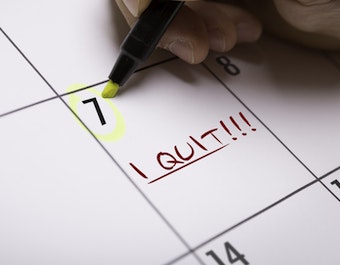Cutting back can be a first step to quitting
If you want to quit smoking but haven’t been able to break the habit entirely, there’s still hope. Some studies suggest that reducing the amount you smoke can help your health and improve your odds of quitting altogether. (Quitting entirely is still best.)
According to one long-term study in Israel, smokers who cut down their daily cigarettes improved their health risks caused by smoking. Compared with people who didn’t cut back, those who smoked less lowered their risk of heart disease and lived longer. Many were in their 50s and had been heavy smokers (a pack a day or more) for decades.
Reduce your use
For some people, quitting “cold turkey” can seem impossible. The trick is to pace yourself and have smaller milestone goals. For example, try smoking one fewer cigarette for two or three days. Once you can do that, cut out two for a few days, and so on. You could also do this in combination with other things, like a patch. Keep going until you’re officially a quitter!
It might take you a month or more to get to this point, but that’s OK. Cutting down too quickly might trigger nicotine withdrawal symptoms that are too strong to resist, and you could end up back where you started.
This is also a great strategy to try a month or so before your quit date, if you have one, since it will start to wean you off nicotine and help you develop skills to resist temptation — hopefully, for good.
Wait a few minutes before lighting up
Another way to smoke fewer cigarettes is to put off having your next smoke as long as you can. Nicotine cravings can be intense, but they typically last no more than 5 to 10 minutes. Try riding out the urge to smoke by talking to a friend, doing something that keeps you busy, or going somewhere where smoking isn’t allowed. Repeat this as many times as you need to each day. It might be hard at first, but it should get easier.
Hopefully, you’ll not only smoke fewer cigarettes over the course of a day, you’ll also be training yourself in the skills you need to quit smoking completely. To learn more about your smoking triggers and how to manage them, check out our mission called "Tame your tobacco triggers."
It’s never too late
Health experts agree that quitting smoking has major health benefits that start to kick in right away and just keep going the longer you stay off cigarettes. For example, your heart rate and blood pressure drop to healthier levels in as little as 20 minutes after your last cigarette.
By three months, your circulation will improve and your lung capacity will increase. A year after quitting, an ex-smoker’s risk of heart disease is down to half of what it was while smoking. Over the next 5 to 10 years, your risk of various kinds of cancer drops, and will keep on dropping. Remember to celebrate your successes, and good luck!
Selected references
American Cancer Society. Guide to Quitting Smoking. Last revised February 6, 2014. American Cancer Society website.
Mayo Clinic Staff. Quit Smoking: Strategies to Help You Quit. Mayo Clinic website.
Gerber Y, Myers V, and Goldbourt U. Smoking Reduction at Midlife and Lifetime Mortality Risk in Men: A Prospective Cohort Study. American Journal of Epidemiology. Accepted November 2011. [Link]





